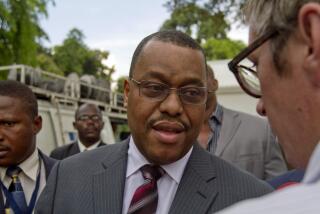World Perspective : CARIBBEAN : Two Firsts for Haitian Vote: No Fear, No Excitement Either
- Share via
PORT-AU-PRINCE, Haiti — For the first time in its history, Haiti will hold elections free of fear of the country’s military as 3.5 million Haitians select a new Parliament, mayors and local officials.
Since Haiti broke from France and declared itself a republic 191 years ago, every election here, fair and foul alike, has depended on the attitude of the army.
That, Haitian political experts say, includes the 1990 balloting that brought the nation its first democratically elected president, Jean-Bertrand Aristide.
“The 1990 vote was largely free and fair,” political scientist Leopold Belagare said, “but its success was totally dependent on the army. If the generals had said they didn’t want an honest election, there wouldn’t have been one.”
The military dominance was made clear Sept. 30, 1991, when the very army officers who had guaranteed the fairness of the vote overthrew Aristide less than a year after he assumed office.
As a result of the destruction of the Haitian army in the wake of September’s U.S. military intervention and the subsequent restoration of Aristide, that has all changed.
*
“There is no army now,” a diplomat said. “This election may be an administrative nightmare. It could be violent, it could even be fraudulent--although I don’t think it will--but its very existence won’t depend on the [military] thugs who have run this place since 1804.”
Actually, for a nation still afflicted by the effects of three years of corrupt and brutal military rule, the current campaign has been largely free of violence, scandal, administrative missteps or excitement.
Experts say this is partly because of the nature of the voting. “Aristide isn’t running,” another diplomat said, “and there isn’t a presidential race. So as with most lower-level elections, there just isn’t the verve, the interest.”
Another factor is the assumption by nearly everyone here that Aristide’s party, the Lavalas Political Organization, or OPL, will dominate the voting, to be held Sunday.
Diplomats and other experts say OPL could easily win 75% of the 18 Senate and 83 Chamber of Deputies seats being contested.
*
“Lavalas could even do better in the countryside,” a U.N. official said. Voters will also elect members of 133 city councils, including mayors, and 561 community boards.
When registration closed earlier this month, 10,558 people had signed up to run, the overwhelming majority Aristide supporters. Even the two major opposition parties, the National Front for Change and Democracy and the National Congress for Democratic Movements, supported Aristide in 1990.
Whatever the reason, the campaign has been dull, particularly by past Haitian practices.
Rallies have been rare, election experts say, with most campaigning limited to posting signs on walls and pillars.
Also few and far between have been incidents of violence. Although human rights groups have complained of political violence and electoral irregularities in recent weeks, U.N. officials have catalogued only four confirmed incidents of election-related violence since May 1.
“The fear of political violence was always overblown,” a diplomat said. “The only real election violence Haiti has had came from the army and its civilian goons. With the army out of the way, there hasn’t been much to worry about.”
If there is violence, most experts say, it will come because of confusion and mismanagement of the count. With every vote to be counted by hand, often in out-of-the-way polling stations, the results won’t be in for seven to 10 days, election officials say.
More to Read
Sign up for Essential California
The most important California stories and recommendations in your inbox every morning.
You may occasionally receive promotional content from the Los Angeles Times.










